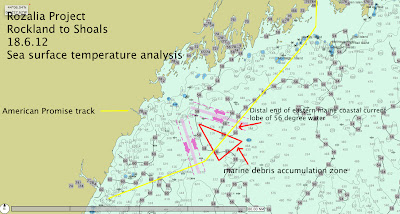Last week, we had 2 failures for every success.
Last week was a very important week for Rozalia Project, and for me personally.
Because, last week, as we dealt with weather that blocked our plans and we set off to master our equipment in preparation for the real objective, I had a revelation.
Kelp is beautiful
Deaths that do no good - ban bottom trawling
So, we are going to expand our work. We started Expedition PROTECT to save Cashes Ledge and its kelp forest and ecosystem from a proposal to open 75% of that currently protected area to bottom trawling. And we are still on that. But, we are also going to take on protecting all kelp forests - starting with the ones in the Gulf of Maine. The only way to do that is to completely ban bottom trawling - stop the destruction of the kelp forests and the decimation of whole ecosystems.
Time to pick sides
Personally, this is a bit new. Honestly, no one has ever argued against our work with marine debris. The issue may offer lots of opportunity for discussion on whether education, remediation or research is the best way to spend one's time addressing trash in the ocean, but no one has opposed our fundamental message that marine debris is dangerous and bad for the marine environment. This issue, on the other hand, does have sides. There are people who try to downplay the negative effects of bottom trawling by saying that the technology has come a long way, that these fisheries support families and culture. We will have opponents.
Bring them on. In the case for or against bottom trawling, I am having a hard time finding arguments for it as a fishing technique. We either take the drastic steps necessary to ban bottom trawling and allow our ocean to thrive or we continue to see planet-wide, long-term loss of shocking proportion, all for the short term benefit of a few large companies and 10 minutes on a plate. People have the choice to do the right thing and adapt to a new reality; the ocean may simply not be able to bounce back - unless we take action to preserve our kelp forests!
Let's make a difference now
It starts now, we have an opportunity in the fall to save Cashes Ledge. I hope you will stand with us and support our work with a donation, with your signature, and with your ability to share and spread the word.
For a clean (and thriving) ocean,
rzm
#kelpingitreal
#protecttheocean





